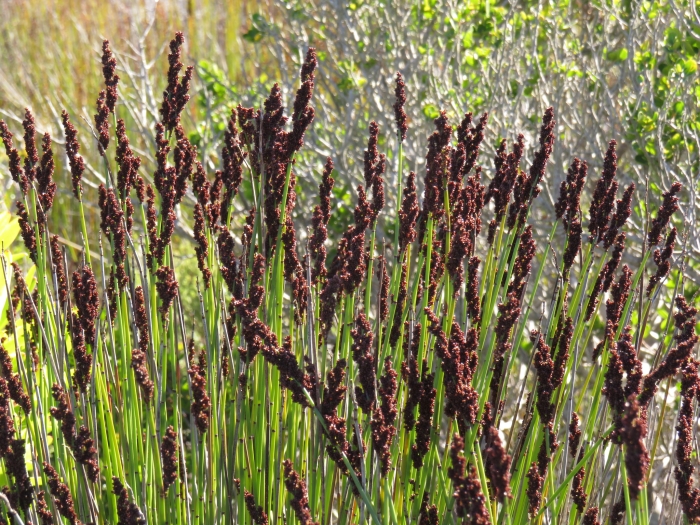Cape Thatching Reed
(Elegia tectorum)
Cape Thatching Reed (Elegia tectorum)
/
/

Jeremy Gilmore
CC BY 4.0
Image By:
Jeremy Gilmore
Recorded By:
Copyright:
CC BY 4.0
Copyright Notice:
Photo by: Jeremy Gilmore | License Type: CC BY 4.0 | License URL: http://creativecommons.org/licenses/by/4.0/ | Rights Holder: Jeremy Gilmore | Publisher: iNaturalist | Date Created: 2021-05-23T11:41:35-07:00 |

























Estimated Native Range
Summary
Elegia tectorum, commonly known as Cape Thatching Reed, is a deciduous perennial herb native to the fynbos and coastal plains of the Western Cape in South Africa. It typically grows to a height of 1.5 to 2.25 meters and features long, slender culms with deciduous leaf sheaths that give it a reed-like appearance. The small flowers, less than 3 mm long, are inconspicuous and may have petals that are smooth or hairy in the upper half. Flowering occurs in late summer to fall, and while the flowers are not showy, the plant’s overall form adds a unique texture to the garden landscape.
Cape Thatching Reed is valued for its architectural form and is often used in ornamental grass plantings, as well as for thatching roofs in its native region. It has earned the Royal Horticultural Society’s Award of Garden Merit, indicating its exceptional performance in gardens. This plant thrives in full sun and is drought-tolerant, requiring low to medium amounts of water once established. It prefers well-drained soils and can tolerate a range of soil types, making it a versatile choice for gardeners. While generally low-maintenance, it may require protection from frost in colder climates.CC BY-SA 4.0
Cape Thatching Reed is valued for its architectural form and is often used in ornamental grass plantings, as well as for thatching roofs in its native region. It has earned the Royal Horticultural Society’s Award of Garden Merit, indicating its exceptional performance in gardens. This plant thrives in full sun and is drought-tolerant, requiring low to medium amounts of water once established. It prefers well-drained soils and can tolerate a range of soil types, making it a versatile choice for gardeners. While generally low-maintenance, it may require protection from frost in colder climates.CC BY-SA 4.0
Plant Description
- Plant Type: Herb
- Height: 2-3 feet
- Width: 3-4 feet
- Growth Rate: Slow
- Flower Color: N/A
- Flowering Season: Spring
- Leaf Retention: Deciduous
Growth Requirements
- Sun: Full Sun
- Water: Low, Medium
- Drainage: Fast
Common Uses
Border Plant, Deer Resistant, Drought Tolerant, Groundcover, Low Maintenance, Potted Plant, Rabbit Resistant, Salt Tolerant, Street Planting
Natural Habitat
Native to the fynbos and coastal plains of the Western Cape in South Africa
Other Names
Common Names: Dakriet
Scientific Names: , Chondropetalum tectorum, Elegia tectorum, Restio tectorum, Dovea tectorum, Dovea cylindrostachya,
GBIF Accepted Name: Elegia tectorum (L.f.) Moline & H.P.Linder